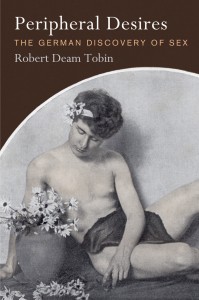Peripheral Desires: The German Discovery of Sex.
 This book studies the emergence of modern categories of sexuality in German-speaking central Europe in the nineteenth and early twentieth centuries. It connects these emergent discourses of sexuality with Romanticism, the German embrace of the classical tradition, Jewish assimilation, nationalism in the Habsburg Empire (particularly among the Hungarians), German colonialism, and women’s emancipation. It focusses on theorists of same-sex desire including Heinrich Hössli, Karl Heinrich Ulrichs, Karl Maria Kertbeny, Carl Westphal, Richard von Krafft-Ebing, Sigmund Freud, Magnus Hirschfeld, Adolf Brand and Hans Blüher. Some of the central literary texts it anal]yzes include Adalbert Stifter’s “Brigitta,” Ernst von Wolzogen’s “Das dritte Geschlecht” [The Third Sex], Thomas Mann’s “Tod in Venedig” [Death in Venice], Robert Musil’s “Mann ohne Eigenschaften” [Mann without Qualities] and Arnold Zweig’s “De Vriendt kehrt heim” [De Vriendt Comes Home]. Among other things, the book endeavors to show that many of the conceptual impasses around sexuality today are rooted in specific aspects of nineteenth- and early twentieth-century central European thought and culture.
This book studies the emergence of modern categories of sexuality in German-speaking central Europe in the nineteenth and early twentieth centuries. It connects these emergent discourses of sexuality with Romanticism, the German embrace of the classical tradition, Jewish assimilation, nationalism in the Habsburg Empire (particularly among the Hungarians), German colonialism, and women’s emancipation. It focusses on theorists of same-sex desire including Heinrich Hössli, Karl Heinrich Ulrichs, Karl Maria Kertbeny, Carl Westphal, Richard von Krafft-Ebing, Sigmund Freud, Magnus Hirschfeld, Adolf Brand and Hans Blüher. Some of the central literary texts it anal]yzes include Adalbert Stifter’s “Brigitta,” Ernst von Wolzogen’s “Das dritte Geschlecht” [The Third Sex], Thomas Mann’s “Tod in Venedig” [Death in Venice], Robert Musil’s “Mann ohne Eigenschaften” [Mann without Qualities] and Arnold Zweig’s “De Vriendt kehrt heim” [De Vriendt Comes Home]. Among other things, the book endeavors to show that many of the conceptual impasses around sexuality today are rooted in specific aspects of nineteenth- and early twentieth-century central European thought and culture.
It is available at the University of Pennsylvania Press website, as well as through booksellers everywhere.